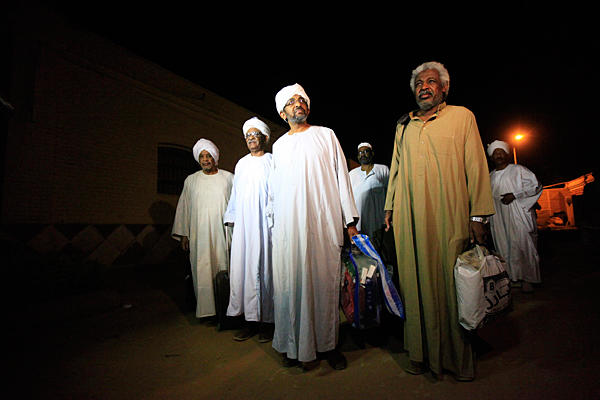Sudan's Bashir starts freeing prisoners, polishing up legacy

By Mike Pflanz, Correspondent / April 2, 2013 at 2:55 pm EDT
In a surprise move, Sudan’s president Omar Al Bashir announced this week he will release all political prisoners and launch talks with opposition groups. Today his government freed seven opposition activists held without charge for three months.
The six men and one woman walked free at dawn and many were met by their families at the gates of Kober Prison in the capital, Khartoum. Most were arrested after they attended a conference in Uganda in January where plans reportedly were discussed to topple Mr. Bashir. They included Youssif al-Koda, Hisham Mufti, and Abdul Aziz Khalid, members of Khartoum’s opposition parties who are beginning to present a unified front against Bashir.
Amnesty International calculates that at least 119 other political detainees are still behind bars in Sudan, many in what it terms “degrading and inhumane conditions.”
Since coming to power in a military coup in 1989, the autocratic ruler has led an increasingly repressive regime whose security services are among the most feared and most powerful in Africa. He is the only sitting president indicted for genocide and war crimes by the International Criminal Court, which accuses him of directing attacks against civilians in Sudan’s western Darfur region. He has ignored the court since it issued a first warrant for his arrest in 2009.
The sudden shift came less than a fortnight after Bashir revealed plans to step down from office in 2015 in an interview with a magazine in Qatar, saying that 20 years at the helm was “more than enough.” The olive branches to his political opponents may be an effort to burnish his legacy.
"He is considering his legacy having indicated he will not run in 2015," says Alex Vines, head of the Africa program at Chatham House, a London-based think tank. "This about the redefinition of Sudan following the independence of the South. Bashir knows old strategies need to be reformed. It is also a clever way to respond to growing unified opposition."
Mr. Vines adds that Bashir is expected to release more prisoners in the coming weeks, in line with the promise made at the state opening of parliament in Khartoum Monday.
“Today, we announce a decision to free all the political prisoners and renew our commitment to all political powers about dialogue,” Bashir said. “We confirm we will continue our communication with all political and social powers without excluding anyone, including those who are armed, for a national dialogue which will bring a solution to all issues.”
That announcement followed a long-awaited deal between his negotiators and those of his counterpart in South Sudan, Salva Kiir, who agreed to resume the flow of southern oil through pipelines to export terminals in Sudan. Mr. Kiir’s government turned off the taps in January 2012 in a row over transit fees that left both countries’ public coffers reeling from the loss of oil revenue.
Opposition remains cautious
But opposition figures in Sudan were cautious about saying that Bashir’s apparent steps onto a path of reform were genuine.
Farouk Abu Issa, who leads a coalition of 20 opposition groups, said “hundreds” of other prisoners were still held. “It is a step forward but we are waiting for many other steps,” he said.
Many were seized from the provinces of Southern Kordofan and Blue Nile, where rebels are battling Bashir’s armed forces.
A series of recent laws that allow Bashir’s security forces great leeway in defining and clamping down on dissent must be repealed to show true commitment to reform, said Amnesty’s Jean-Baptiste Gallopin.
“The measures taken so far are very limited,” he said. “If you look at this in the broader legal context that allows the authorities to carry out the repression that we see in Sudan, there is little sign that that is going to change.”
source : http://www.csmonitor.com/


![[AIM] Asmarino Independent Media](/images/logo/ailogo.png)